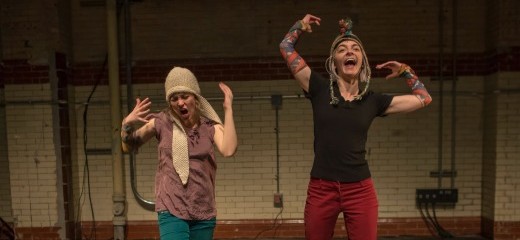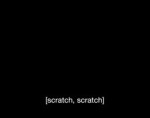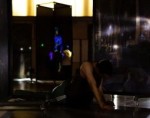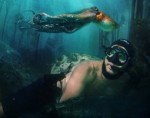
Photo: Kevin Monko
Sparks Fly From a Volatile Mix
by Ellen Chenoweth
You’ve got the sacred and the profane. You’ve got some spoken text, some songs, some painting, some dancing. You’ve got smart bodies and smart brains. You’ve got a professional work that’s still charmingly rough around the edges. At the core, you have aggression with vulnerability. A volatile mixture of elements is the key to the zip-zangy success of
The Vulgar Early Works. Philadelphia artists Chelsea Murphy and Magda San Millán, both in their mid-20s, have been working together for several years; this is their first evening-length work, a loose conglomeration of previous short works that bleed into each other.
Two elements that are not in opposition are Magda and Chelsea themselves. In a
recent interview, they respond to the questions separately but with remarkably similar ideas, always in harmony with one another. This synchronicity has clearly developed as a result of spending lots of time together. On stage they use each other as launch pads for jumps, or as snuggle buddies, or confessors. This is not a fraught relationship, but rather a happy friendship of equals. (Who knows if this is true offstage, although I love the program note that “no one was stressed out in the making of tonight’s entertainment.”) The two met at the Headlong Performance Institute, a flagship program of Philadelphia dance gurus at Headlong Dance Theater, and it’s easy to imagine Headlong using
The Vulgar Early Works as a compelling infomercial for the program. Musician Michael Kiley created the soundscore and original compositions, adding to the work with a sensitive use of silence and textured sonic landscapes.
The show opens in the guise of a pre-show chat from the artists, with the two women earnestly discussing their process and the lens through which to view the work. They are still earnestly addressing us when they start plunging their hands down their pants, maintaining the dialogue and direct gaze at the audience. The conclusion of this signature segment has the two women smearing their hands over each other’s faces. “Ewwwws” abound around me. The women have established their intimacy and comfort with each other. There’s some unexpected unison dancey-dancing for a few minutes in the next segment, and we see that these are trained bodies—it’s evident in the feet, the arms, the fluidity. I’m surprised by how strongly this section pulls me into the work; it feels like discovering mutual friends when chatting with a stranger.
The laughs come frequently. Magda describes her journey to self-love and acceptance, skewering well-meaning advisors who suggest getting a pedicure when overwhelmed by life. “It would be better to meditate or masturbate, but since both of those are hard to do 24/7, how am I going through the car of my mind in the world?” she asks while driving an imaginary car over what looks to be a very bumpy road.
The costumes alone are unusual enough that I can feel new neural pathways forming as I take them in. At one point, Magda is sporting a drawn-on black beard, a floral shirt, with additional fake flowers attached for good measure, cool-kid red shorts, and golden tennis shoes (a reference to the Mummers and their golden slippers?), while for another section she is dressed like a Baptist schoolmarm from the ‘70s in long floral skirt and long-sleeved pastel print top. My favorite Chelsea look includes a white knit cap with very long flaps, evoking Amelia Earhart, circa 2030.
It’s rare to see this brash and sexual feminism practiced with such aplomb and nuance. Chelsea and Magda’s characters are unapologetic. At one point Magda pretends her breasts are weapons, and sprays the audience with their imaginary bullets. But they talk about their loneliness as much as their sex drive. They feel alive and real and complicated. They embrace their contradictions and confusions, singing loudly that, “These are the things that we want to be doing//But we judge ourselves for doing//Cuz we think we should be doing something else.”
M: swiping left on Tinder
C: instead of writing in my journal
M: writing in my journal again
C: instead of interacting with men
M: being very socially aggressive
C: instead of open and receptive.
In another segment, Magda’s right leg makes a big arc in the air that would not look out of place in a Martha Graham work, but then the foot comes down in a fierce stomp, Martha suddenly morphing into a Neanderthal.
In the interview, Magda says, “Every day, every month I am always scheming about how to make my life easier and my art fuller. And dammit because they don’t mutually exclude each other.” This line of long-term thinking warms my soul, and makes me look forward to seeing years of work ahead, possibly including An Oceanic Exploration of the Somber Middle Works, The Late Late Works (GREEN all over), or maybe Portrait of the Artists as Middle-Aged Women. Whatever directions they go from here, Chelsea and Magda have marked their arrival with a gleeful cannonball into the deep end.
The Vulgar Early Works, Chelsea & Magda, FringeArts, February 19-21.
By Ellen Chenoweth
February 26, 2015







.png)


